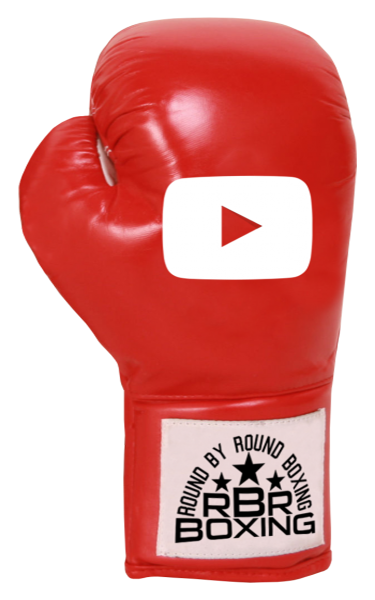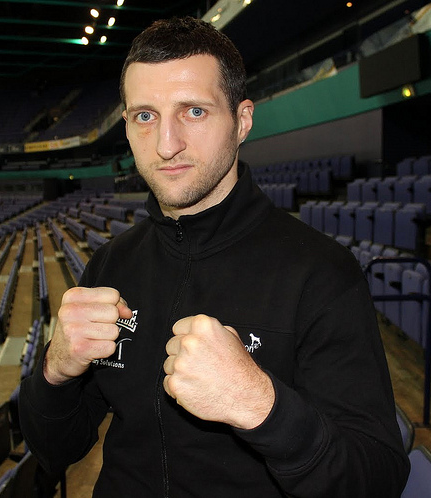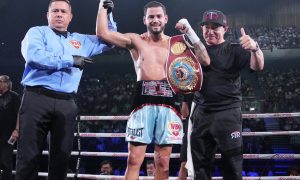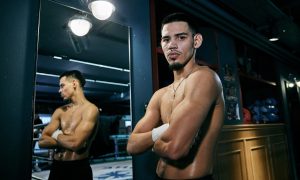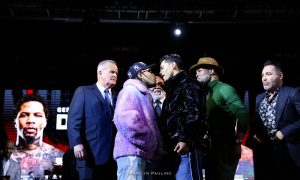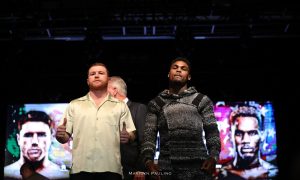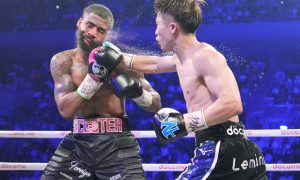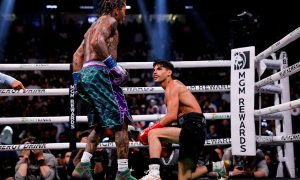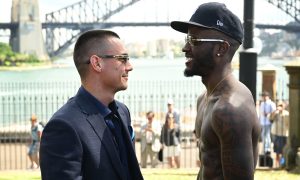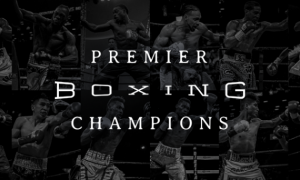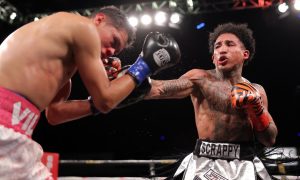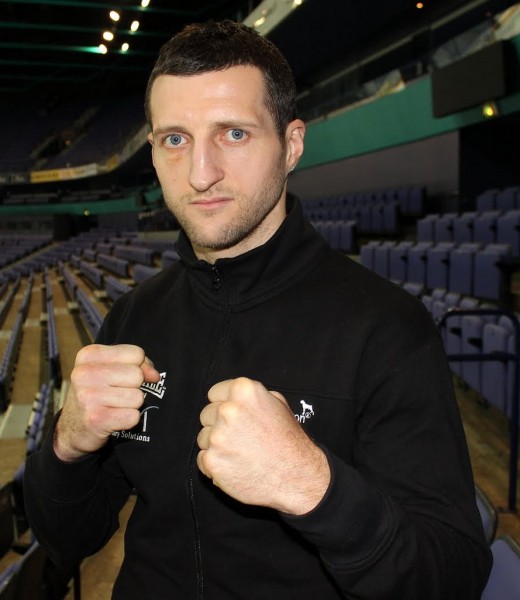
Carl Froch: Remembering A Champion
The news has come to light that Carl ‘The Cobra’ Froch is calling it time on an exciting career in the ring, with a role in front of the cameras next on his agenda. Stating that he has ‘nothing left to prove’, the Nottingham man skips a potentially lucrative final fight to take up a punditry role with Sky Sports in the UK.
Sky Sports have always had respectable boxing coverage with useful analysis and Froch will be no exception to that, depending whether he can keep his ego in check to talk about the fights. It was up in the air as to whether we’d see Froch step between the ropes again, with unbeaten star Gennady Golovkin amongst the touted retirement fights.
However, he’ll go out on a high with his final punch in the ring being that one…. Yes, the one that knocked out George Groves in front of 80,000 people at Wembley. Quite often we see the stars go on too long, buoyed by their competitive nature, the large amounts of money on the table, and sometimes the desire of the fans to see them return.
We can see it in plenty of all-time greats who are still doing the rounds as we speak. Only they suffer the consequences in later life so it’s great to see Froch stick to his guns and bow out and keep his health in check. He’s not known for Mayweather-esque evasion. Froch is in wars, he hits and gets hit. A lot. And that takes its toll so we’re glad to see him take this move at 38 years of age.
We’d like to commemorate that by looking at some of his finest moments in a glittering career.
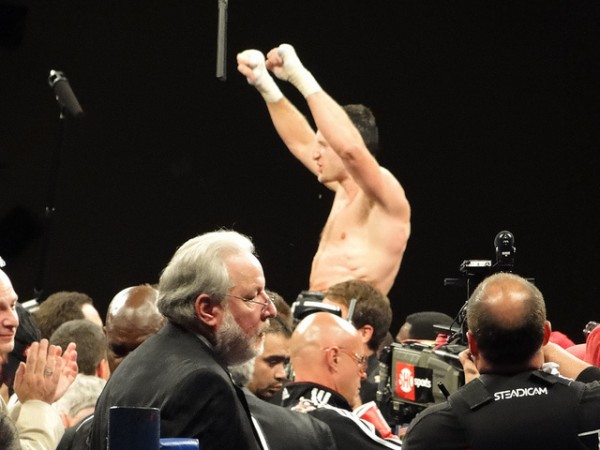
They were going to get addressed at some point, so why not get them out of the way first. Froch vs. Groves I was one of the most eagerly anticipated British boxing bouts of recent times. Neither man backed down from the pre-fight hype, with both going into specific detail on how they would eagerly batter their foe around the ring. Though many thought it was too soon for the younger man to take on a world champion, Groves delivered on his word and took to the middle of the ring to lay some punishment on the title holder.
At the end of the first, Groves clipped Froch with a hard overhand right that sent him to the canvas, and a shocked crowd were silenced as they watched their man clamber to his feet to make the count. It was shocking the manner in which Groves had set his stall out, and he continued to work well all the way until the end. It was the end that will always be remember, though.
After nine tough rounds, Groves was ahead and edging closer to a huge upset. In typical ‘Cobra’ fashion, it isn’t over until it’s over. He clipped Groves with a right and then a flurry of shots saw referee Howard Foster call a halt to the fight whilst the challenger was still on his feet. Merciful maybe, and maybe a finish was inevitable after that onslaught, but fans and experts alike seemed to be unanimous in thinking it was called before a conclusive end was reached.
Given the controversy, the bad blood, and Groves’ excellent showing until the finish, a high-profile second encounter was always going to be a winner for both men. In terms of commercial appeal it certainly was. Yes, they packed 80,000 people into Wembley for it. Tickets sold like hot cakes and it broke the British record for attendance post World War II. It became a colossal encounter, and Groves wanted payback.
He wouldn’t get it. In fact, he would be emphatically knocked out in front of an enormous crowd in attendance at Wembley, and even more watching at home. A savage right hand got through the gap and separated him from his senses, as referee Charlie Fitch waved it off in the eighth. He might have been able to cry “robbery” the first time, but the second time he was convincingly beaten.
His late KO of Jermain Taylor
If somebody asked to be shown one fight to epitomise what Froch was really about then show them this one. Jermain Taylor was the former undisputed middleweight champion of the world, and though he wasn’t reigning at the time, he was still a formidable foe for any boxer at that weight on the planet. He showed that quite comprehensively in the early running of the fight, dictating the action in the first two rounds and then flooring Froch in the third. It wasn’t looking good for the Englishman, and things could have become much worse. That’s when Froch’s heart began to tel,l though, and from the middle of the fight he started to push back.
As they came into the final round of the fight, two of the judges had Taylor a clear winner, meaning Froch needed a stoppage to have any chance of victory. The odds looked stacked against him, but rather than sitting back and accepting the verdict of the judges, he decided to plough forward and caught Taylor early. To the American’s credit, he was wobbly for a good portion of the round but took hard shot after hard shot and stayed standing. Winning meant a lot to him, too. It was Froch that wanted it more and he rallied to get the TKO with only seconds left.
Super Six Performances
When the Super Six format was announced, Froch was certainly an underdog. Andre Ward eventually showed his class to defeat Froch, but some of the performances were a revelation to the majority of the boxing world. The Olympic champion Ward was just too slick a boxer to be drawn into a characteristic Froch slugfest and cruised to victory. It’s the one thing the Nottingham pugilist has never got redemption for in his career.
Froch showed he could mix with the elite and it elevated him to the number two super middleweight in the world, with no shortage of accolades for his tenacity and punching power. He opened up his account with a split decision win over unbeaten Andre Dirrell, although there were plenty that thought the decision should have gone the other way. Froch’s aggression and come forward style were rewarded by two of the three judges on the night and he would never be one to complain about that.
As he went on to drop a decision to Kessler, even then the close fight left people thinking more highly of him than when he went in. He was beginning to be seen as more than just a scrapper who finds a way, although he’d never totally shake that tag. When Kessler backed out, Froch was back in on the action against a big puncher in Arthur Abraham. It was another battle behind enemy lines but the one-sided nature of the fight couldn’t even let Finnish judges begin to turn out suspect scorecards. Froch cleaned up 119–109, 120–108 and 120–108, and against a boxer as highly rated as Abraham, it really took him to the next level.
Abraham was a man who had defended the IBF world title 11 times. He had an astonishing KO ratio but never managed to really move his English opponent. Froch went from a dubious decision and most thinking he could have been out of his depth to arguably one of the best performances of his career that emphatically showed he was world class. He might have never had the opportunity had Kessler not withdrawn injured and things could be quite different now, but he did and he made the opportunity count.
Jean Pascal and his first world title
This was a huge moment in the development of Froch as a boxer and as a star. At 23-0, his sights were set on the big guns and he had attracted attention from Jean Pascal, who was also in line for a WBC title shot. Pascal too was undefeated at 21-0 so there was a lot at stake for both men. Neither came to passively win a decision as they duked it out from the off, exchanging solid punches and proudly showing their whiskers as they went dig for dig in the early running.
Froch always seemed to be one step ahead, although he couldn’t get complacent. Pascal is a hard hitter and showed that every time Froch took his lead for granted. After the 12 rounds were up, it was clear that Froch would take the title at the Nottingham Arena, and also clear that we’d witness an epic 36 minutes of boxing from two very high-level and extremely tough battlers. They had promised a rematch down the line and no fan would have argued with it, but it never came off and we were left with just the one legendary encounter between the pair.
Wrapping the WBC belt around his waist opened up a lot of doors for Froch, leading to the Jermain Taylor bout and his entry into the Super Six. Effectively, it was the start of his superstardom and led to, you know, that thing that happened at Wembley in front of 80,000 people?
Getting back at Kessler
Mikkel Kessler was as legitimate as they come when Froch went to his home nation of Denmark to challenge him. Fighting in an opponent’s home country is never easy, and ‘The Cobra’ found this out in 2010. Froch suggested the decision might have even gone his way on home soil but instead it was his first professional defeat. He could have sat back and let it niggle at him. Instead, he sought revenge and finally got Kessler to agree to the rematch in London three years later.
Kessler had won another three fights in that time, whilst Froch had gone 4-1. They took to the O2 Arena with a score to settle, and second time round it was the Englishman on English soil getting the nod. This time was somewhat more conclusive with less debate on the rationale of the scorecards, so Froch had effectively put to bed that demon. There was only Ward left to avenge – something Froch wanted badly – but that would evade him right until the end, leading to this decision to retire from the sport off the back of his Grove victories.
There are some of our favourite Froch moments, and he has given us more than his share of entertainment inside the ring. He moves on to pastures new and will be looking to entertain and inform outside of it. There might always be a ‘what if?’ surrounding his departure, with GGG and Ward on and off the table at various points, but neither are seen as a good curtain call on his career. Realistically they were fights he would make entertaining but be hard pressed to win. He goes out a champion, and he goes out in one piece. And did we mention it was just after he had knocked out Groves at Wembley in front of 80,000 people?



